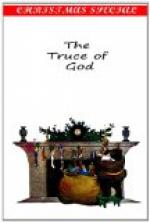It was the eleventh century: the sun shone as brightly then as now; ay, and virtue too, though sympathy for a lustful tyrant has stamped the age with infamy. Through an extensive forest in Suabia, as the old chronicle from which I copy relates, a gallant youth was urging on, with voice and rein, a steed that seemed as bold and fiery as his rider. The youth’s flashing eye, and the spear in his hand, told clearly enough that the boar was before him. On he went, as if the forest were his element, now bending low beneath the knotted bough, now swerving aside from the stern old trunk which sturdily opposed his progress, and seemed to mock him as he passed. On he went, as if danger were behind and safety before him; as if he galloped to save his own life, not to risk it in taking a boar’s. An angry bark and a fearful howl rang in the distance, and the hunter’s bugle sounded a merry blast. On he went, faster than before, and now as if he sought his mortal foe. The boar was at bay; monarch of the wood, he had turned to defend his realm, and his white tusks were soon red with the blood of the noble hounds who fearlessly disputed his right. The youth leaped from his horse with the speed of thought. Bred to the chase, the well-trained animal stood firm while his master cautiously, but with the calmness of the victor of a hundred frays, advanced against the bristling monster. Quitting the dogs for this new assailant, the boar came madly on; the huntsman sank upon one knee, and so true was his eye, and so firm his hand, that the heart of the savage was cloven by the spear. The youth rose to his feet, dizzy from the shock, and, springing nimbly upon the grim body of his prostrate victim, his fine form swelling with the rapture of his recent triumph, brought his horn to his lips, and again its notes went ringing merrily through the woods.
Echoes, like fading memories, growing fainter and fainter as they receded, gave the only response.
“Where can they be?” said the youth, “their steeds were fleet. Out of sight and out of hearing! How completely I have beaten them.”
He laughed triumphantly as he said this, and, sitting down upon the long grass, began to caress an enormous hound that panted at his feet, as unconcernedly as though the forest now contained nothing more formidable than doves or lambs. His horse, thoroughly domesticated, strayed a little from the dead boar, feeding as it went.
The youth took off his plumed bonnet, and, flinging back his long black hair, fell into one of those light, smiling day-dreams which belong only to the young and innocent. He built fifteen air-castles in as many minutes. But at last he grew impatient; he sounded blast after blast; still no answer came. The trees kept up their sleepy sigh, and the sapless branches creaked, but no human voice, no human foot save his own, broke the silence.
“Thou hast given me a goodly chase,” exclaimed the youth, springing up and addressing the boar, “and I shall wear this in remembrance of thee.”




